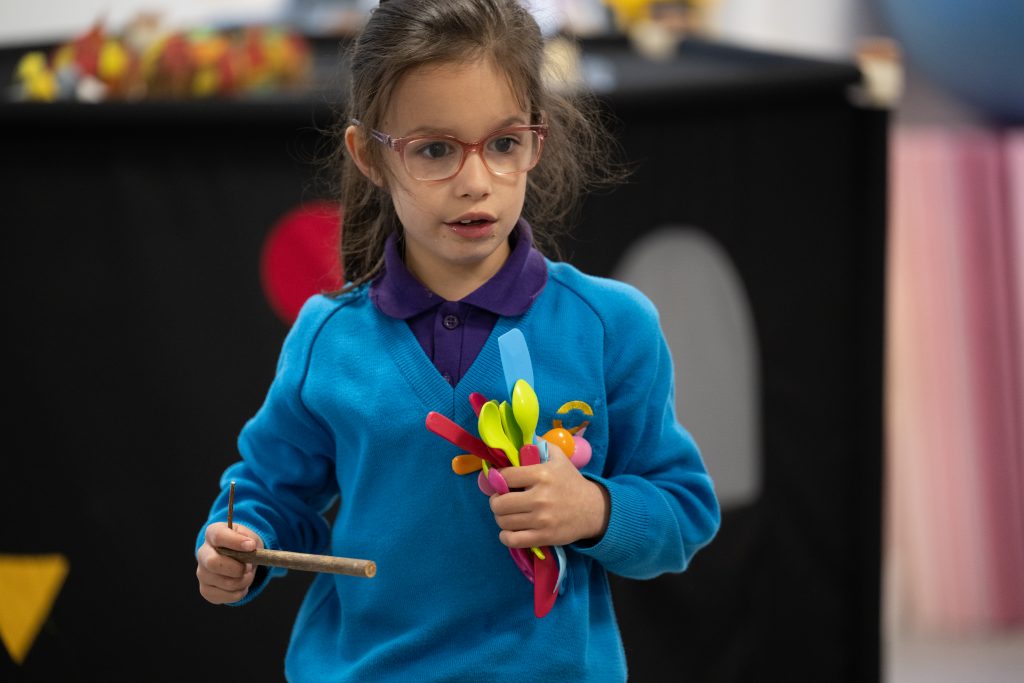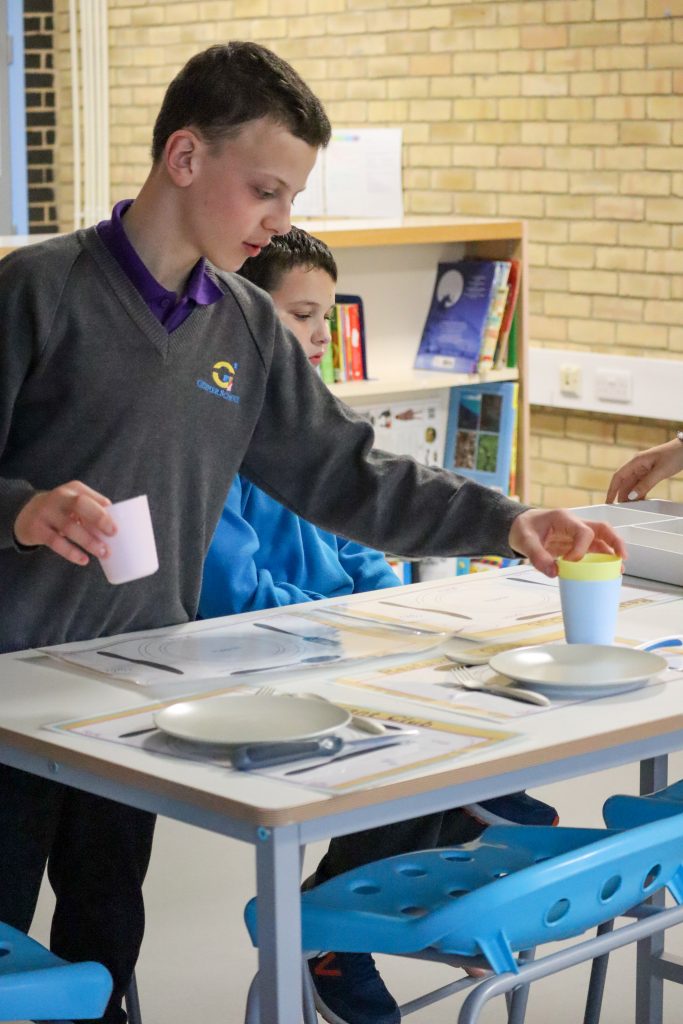Creating a Life Skills Space Within a School
Danielle Petar, Emily Bacon, Michal Geller
At Gesher we want our young people to enjoy school. We want them to enjoy learning with one another and supporting each other to succeed. We want them to have great experiences; to love physical and creative activities; to enjoy the unity of a shared faith; to find things in the curriculum that they can be passionate about; to be proud of their exhibitions of work and the real-world projects that make a difference in our community. And, of course, we want them to leave us with the best qualifications possible.
All that having been said, we are a school for young people, many of whom started their school career in a mainstream school which was not well equipped to support them. Parents (and young people as they mature) inevitably have concerns about how well they will cope with the mainstream life of employment and relationships and independent living. This is the world beyond Gesher.
And this is why we have developed a coherent, progressive and continuously evolving life skills curriculum. We are passionate about preparing learners to be assured and adept when they eventually progress from Gesher, as employees, friends, partners and citizens of the world.

The Gesher Life Skills Space — from top left (clockwise): bed, wardrobe, lounge area, fully functioning kitchen with hot plates, toaster, kettle, microwave, blender, fridge, sink, dining table and chairs, cash register, desk and computer, ironing board and iron, and a ‘my body’ area with a mirror and personal grooming tools.
Creating a life skills space within a school
Ask ChatGPT what you need to set up a life skills classroom and you’ll be given a list of eight steps which include finding a space, making a budget and employing a member of staff. Do some of your own research via academic articles and practical textbooks and the same three themes emerge. Sadly, what the AI and the “old-fashioned” research tool don’t take into account is that schools are not generally known for having spare rooms, giant financial budgets, or bonus staff on hand to deliver extra lessons. It can therefore be difficult to know where to start with something like life skills, which generally falls largely outside the traditional curriculum subjects like Maths, English and Science.
In Issue Two of The Bridge, we featured an article about Gesher’s life skills curriculum, so we won’t pretend that we were starting from scratch when we created our life skills classroom space. We knew what our curriculum required by way of facilities. We also won’t pretend that we weren’t lucky enough to have a small space in our school, a modest budget and a skilled member of staff to deliver our sessions. Perhaps we made our own luck!
However, the journey we have travelled puts us in a position to share some of our insights in a practical and accessible way. We are also conscious that, as a result of our own journey, there isn’t a huge amount of practical advice out there for schools wanting to implement and integrate life skills-related learning. We hope this article helps.
Ideally you will find a space, but it can be a shared space.
How we’ve done it
We moved school sites in 2021 and, as such, were in the fortunate position of being able to include in our plans a dedicated space within our building for life skills – in other words, to give it equal claim in the allocation of space, rather than stealing space back from existing use. However, even the room we are currently using is a temporary solution which is shared with our library. (Although, of course, library use is a life skill, too!) To manage this space the room is carefully timetabled to allow for classes to use the library and for classes to use the life skills space. The room is also used for lunchtime clubs and school council meetings, and can be available as an extra learning space.
Things you could try in your setting
Despite the title of this article specifically referring to a space, there is no necessity for life skills to take place in just one place. We could have called it “Creating a life skills mindset”. Areas such as the lunch hall and the staff room (when not being used by staff) are ready-made life skills areas because of the practical and real-world activities that take place in them. The lunch hall, for example, can be used to practise setting the table and preparing food while the staff room is likely to contain a dishwasher, sink, and perhaps even an oven, making it an ideal environment for students to work on kitchen-based skills.
What’s coming next
One of the end goals for the life skills space at Gesher is to have a full-size, self-contained flat which includes a kitchen, bedroom and living area for students to be able to access during their life skills sessions. To do this we are keen to have students’ input to the design and to make it relevant to their interests.
Making good use of the space
How we’ve done it
Our classroom space is set up to emulate elements of a small flat with a kitchen area, a bed and a sofa. Within the room, each item is labelled to support the learning of organisation skills as well as encouraging independence. All of our students use the room once a week for their timetabled life skills lesson. In addition, we have a group of learners (known as our Life Skills Legends) who attend daily life skills sessions in the space. This gives them more time to practise skills and the way the room is laid out also means that skills can be practised in sequence. For example, when doing bedroom-related life skills, students can take the sheets off the bed, wash them in the washing machine, dry them on an airer and then put them back onto the bed.
Things you could try in your setting
If you don’t have the luxury of having a classroom space where life skills teaching can take place, then an alternative could be to have smaller life skills-related materials stored in one place and accessible to staff. For example, items such as a kettle, a toaster and a blender could be stored relatively easily and used for food preparation skills, while items like hairdryers, straighteners and mirrors could be available for students to practise self-care skills. (We’ve included a full list of resources in the Resources for Schools section of this issue). These materials could then be used for in-school sessions. Activities which require large resources, such as a bed or washing machine, could be completed as part of homework tasks which are developed alongside parents. (It is a feature of our programme that parents are partners – deliverers and accreditors.)
What’s coming next
The next phase would be transferring some of the basic life skills activities into employment-related ones. For example, opening an on-site cafe run by the students would allow for greater independence around their food and drink preparation skills. Other examples are creating an allotment on the grounds, planning and running a school visit, or hosting an employers’ event.
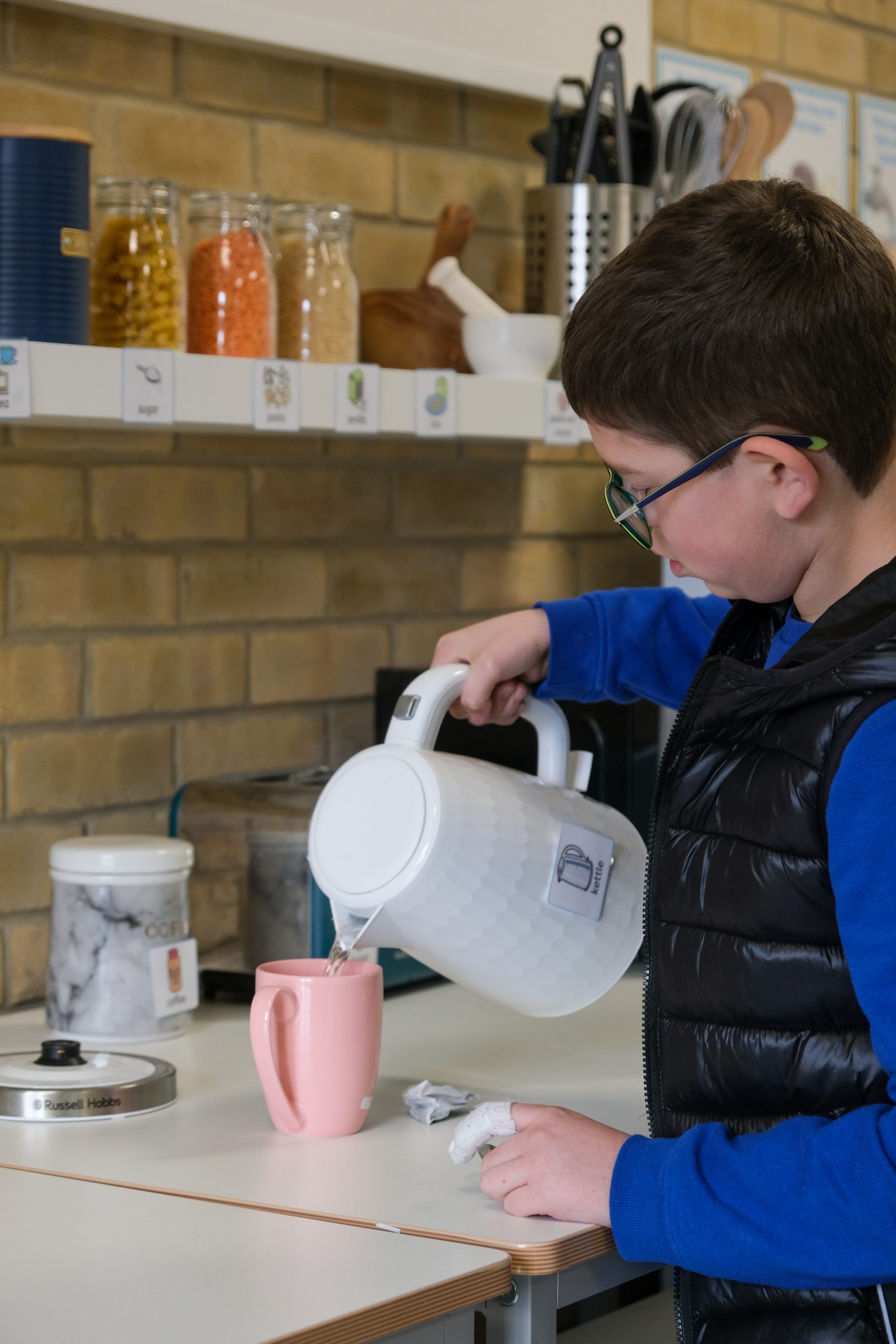
Equipping the space
How we’ve done it
To furnish and equip the life skills rooms, we appealed for donations of furniture from our students’ families and friends, as well as a small amount of financial support from a community donor. Before adding anything to the room we involved parents as well as students to hear their thoughts about what should be included. The clearest piece of feedback that we received from both groups was that the room should be a place where students (as much as possible) could do things independently.
Things you could try in your setting
In the Resources for Schools section at the back of this issue, we have included a shopping list of items that might be useful for life skills sessions. Alongside each item on the list are ideas and suggestions for use. By no means do we have all the answers to these questions, so we would love to hear from you with further creative ideas. You can email us directly via [email protected].
Things that we would like to do…
Moving forward, we would like to incorporate more technology into our life skills sessions. In the first instance, this could involve using online banking and doing an online food shop. However, we would also like eventually to include working with artificial intelligence tools like ChatGPT which, despite offering a rather generic answer to our opening question, will undoubtedly be a huge part of our students’ lives in the future.
Professional Prompt Questions
-
Is life skills education on the agenda for your students, especially the ones most likely to be challenged by the transition to life beyond school?
-
What ideas in this article have most resonance for you? What ideas does your school have that you could share on an email as suggested above?
-
If life skills is not currently a high priority in your school, who might you need to gather together to read this article (and the one in The Bridge 2) and to discuss possible ways forward?

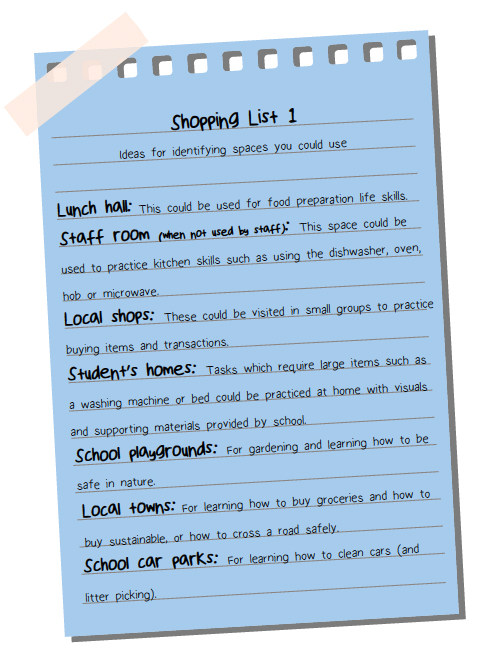
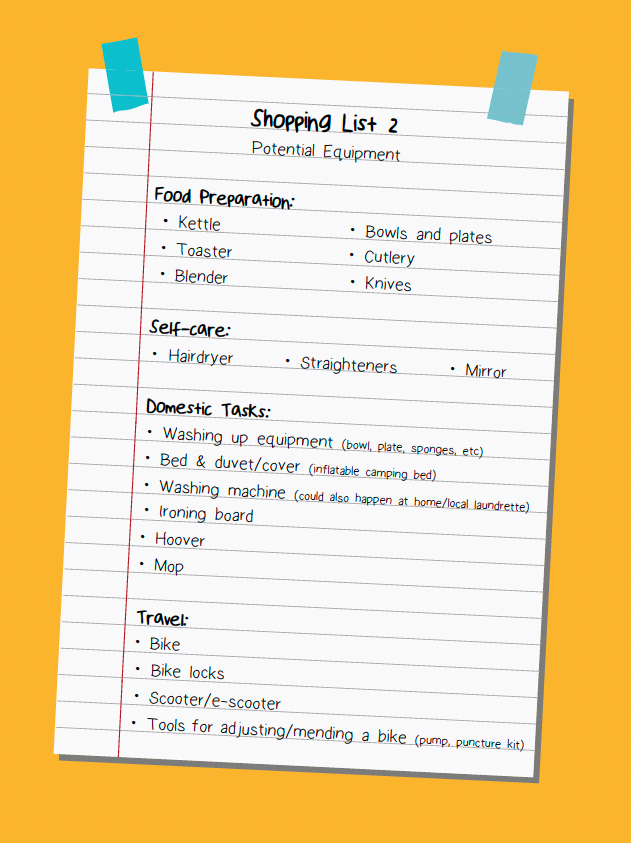


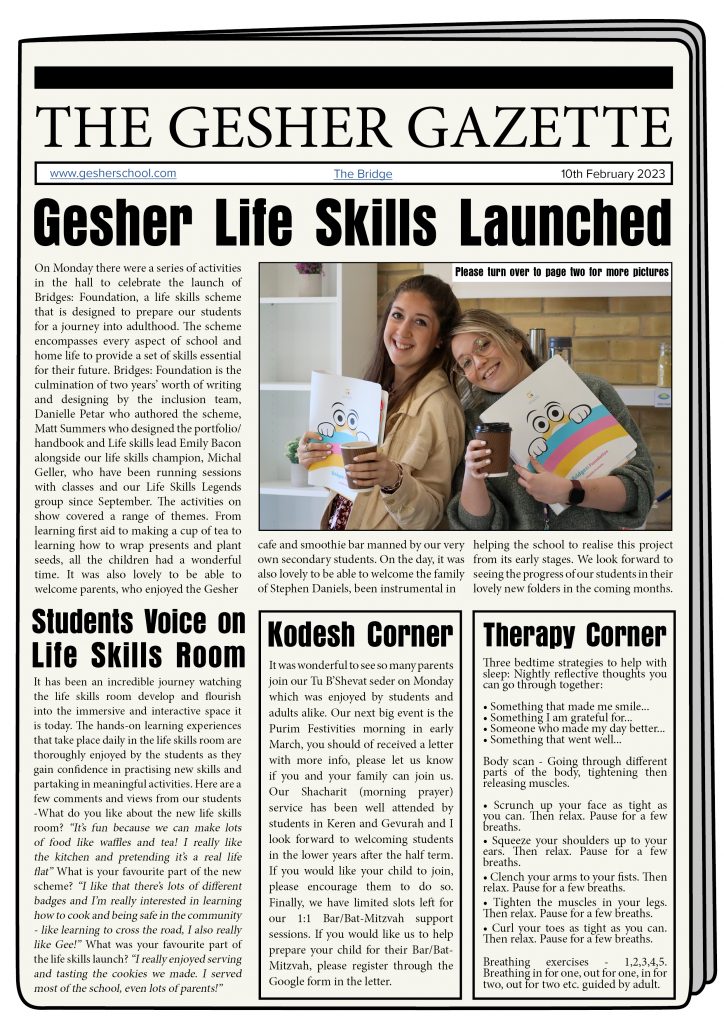
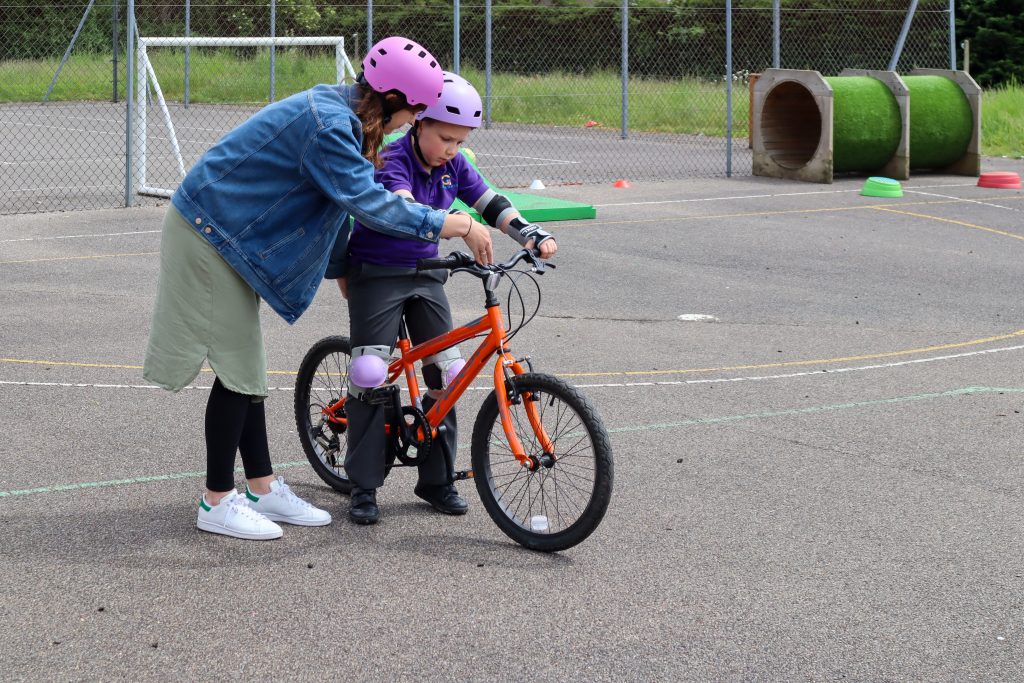
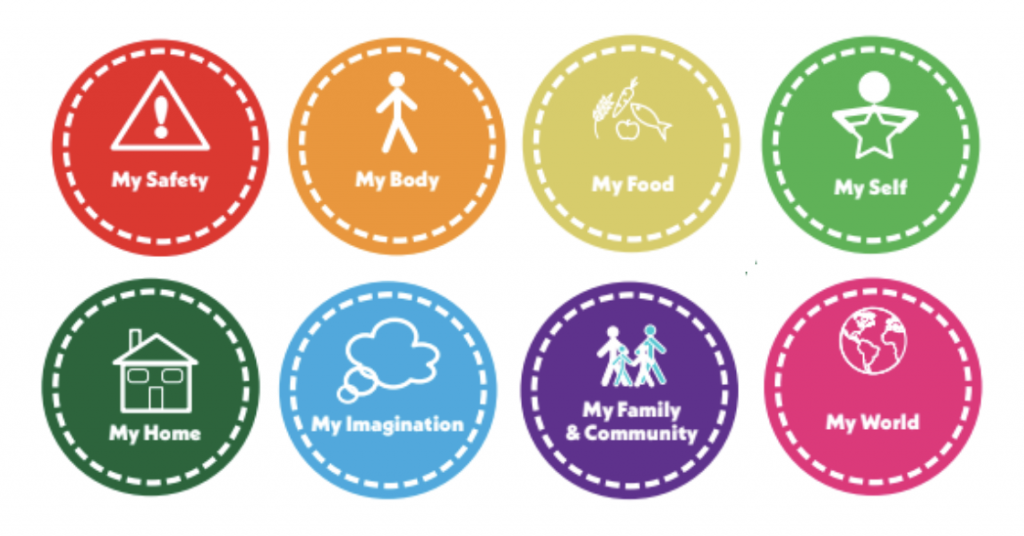 Within each of these themes, there are eleven badges for the students to work towards achieving. In the ‘My Home’ theme, for example, the badges range from ‘Clearing the Table’ to ‘Preparing for Social Occasions’. ‘While each badge is very different they are all designed to focus on developing creativity, critical thinking, problem-solving, decision-making, the ability to communicate and collaborate, as well as commitment to personal and social responsibility.’
Within each of these themes, there are eleven badges for the students to work towards achieving. In the ‘My Home’ theme, for example, the badges range from ‘Clearing the Table’ to ‘Preparing for Social Occasions’. ‘While each badge is very different they are all designed to focus on developing creativity, critical thinking, problem-solving, decision-making, the ability to communicate and collaborate, as well as commitment to personal and social responsibility.’